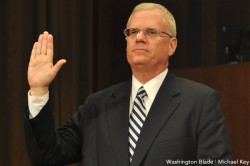National
Gay judge criticized in conservative congressional scorecard
FRC, CitizenLink rank members of Congress on anti-gay votes

Anti-gay groups are decrying the Senate confirmation of a gay federal judge as part of their annual congressional scorecard evaluating the commitment of House and Senate lawmakers to social conservative values.
The scorecard, a joint publication of the Family Research Council and Focus on the Family’s CitizenLink, was made public late Sunday night.
For the Senate, the scorecard rates members on the basis of seven votes over the course of this year — including the confirmation of U.S. District Judge Michael Fitzgerald, who was approved overwhelmingly in March by a 91-6 vote. The scorecard says, “FRC Action and CitizenLink Opposed this Confirmation.”
The scorecard doesn’t explicitly mention that Fitzgerald is gay, but says he “supported liberal activist organizations and worked to promote homosexual rights in the state of his judgeship.” The anti-gay groups cast in a negative light Fitzgerald’s work benefiting the LGBT community prior to his confirmation as a judge and accuse him of withholding information about his past in the questionnaire response he submitted to the Senate Judiciary Committee:
Nominated on July 20, 2011, by President Barack Obama to the U.S. District Court for the Central District of California, Mr. Fitzgerald has supported liberal activist organizations and worked to promote homosexual rights in the state of his judgeship. Mr. Fitzgerald supported activist organizations, such as the Harvard-Radcliffe Gay and Lesbian Caucus that opposed ROTC recruiting at Harvard at the same time now-Supreme Court Justice Elena Kagan was Dean at Harvard Law and refused to allow ROTC recruiters on campus. Mr. Fitzgerald also provided pro-bono work in the 1990 case, Buttino v. F.B.I., in which an FBI agent alleged he was wrongfully dismissed for his sexual preference only to be shown during the case to have lied during an FBI investigation. Mr. Fitzgerald also worked to oppose Proposition 8 in California and failed to mention many of his actions in a questionnaire to the Senate that would have revealed potential conflicts of interest.
Other LGBT-relevant votes by which the scorecard evaluates members of the Senate include passage in April of a bill with explicit LGBT-protections to reauthorize the Violence Against Women Act. The anti-gay group says the Senate version of the legislation “would discriminate against religious grantees who aid abused women if the grantees are opposed to homosexual behavior as a matter of faith.”
Additionally, the scorecard includes the cloture vote that led to the confirmation of Mari Carmon Aponte as U.S. ambassador to El Salvador. She came under fire from social conservatives in part because of a pro-gay op-ed piece she wrote for an El Salvador newspaper during the month of Pride.
Five senators managed a perfect score of “100 percent” as a result of the scorecard: Sens. Roy Blunt (R-Mo.), Jim DeMint (R-S.C.), James Inhofe, (R-Okla.), Mike Lee (R-Utah) and Rand Paul (R-Ky.).
Fred Sainz, vice president of communications at the Human Rights Campaign, responded to the scorecard by invoking former President Reagan and saying the document reflects the Family Research Council’s continued hostility to the LGBT community.
“There they go again,” Sainz said. “Beyond death and taxes, the only other thing that you should count on is that FRC will falsely — and often hatefully – misinterpret issues important to LGBT equality. Their scorecard provides excellent examples of their bizarre animus against members of our community.”
Sainz took issue with the scorecard’s inclusion of the Fitzgerald confirmation vote, noting many Republican senators voted to confirm the judge.
“Despite the fact that Judge Fitzgerald was confirmed by a bipartisan majority of the U.S. Senate (to include Republican senators from Alabama, Georgia, Mississippi and Texas; not to mention Republican Leader Mitch McConnell and Senators McCain and Ayotte), FRC still is hell-bent on the notion that Fitzgerald is out of the mainstream,” Sainz said. “With every passing day, it becomes clearer that it’s FRC that’s out of the mainstream and in fact, painfully representative of an era of discrimination and bigotry.”
Sainz added he expects HRC to issue its own scorecard in late October.
For the House, six votes are included in scorecard, including votes on measures that would restrict abortion rights and repeal health care reform as well as a measure reaffirming the Defense of Marriage Act, which prohibits federal recognition of same-sex marriage. The measure was an amendment to Commerce-Justice-Science appropriations legislation offered by freshman Rep. Tim Huelskamp (R-Kansas) and approved by a vote of 245-171.
But scorecard misstates the practical effect of that amendment, saying the measure would stop the Justice Department from litigating against DOMA in court — a path the Obama administration has followed after declining to defend DOMA. Media reports had previously indicated that Huelskamp intended to offer an amendment to that effect, but the measure ended up saying no federal funds could be used to contravene DOMA, which would do nothing to prevent the Justice Department from presenting the view of the federal government in court that DOMA is unconstitutional.
The Huelskamp amendment isn’t the only one reaffirming DOMA that was offered on the House floor this year. Rep. Steve King (R-Iowa) submitted a similar amendment that passed on the House floor as part of a defense spending measure. It’s unclear why the scorecard doesn’t includes this vote as part of its evaluation of House lawmakers.
More than 100 members of the Republican-controlled House are credited with voting each time with views consistent with the Family Research Council and CitizenLink, including Reps. Michelle Bachmann (R-Minn.), Allen West (R-Fla.) and Vicky Hartzler (R-Mo.).
FRC didn’t immediately respond to questions about the scorecard.
New York
Two teens shot steps from Stonewall Inn after NYC Pride parade
One of the victims remains in critical condition

On Sunday night, following the annual NYC Pride March, two girls were shot in Sheridan Square, feet away from the historic Stonewall Inn.
According to an NYPD report, the two girls, aged 16 and 17, were shot around 10:15 p.m. as Pride festivities began to wind down. The 16-year-old was struck in the head and, according to police sources, is said to be in critical condition, while the 17-year-old was said to be in stable condition.
The Washington Blade confirmed with the NYPD the details from the police reports and learned no arrests had been made as of noon Monday.
The shooting took place in the Greenwich Village neighborhood of Manhattan, mere feet away from the most famous gay bar in the city — if not the world — the Stonewall Inn. Earlier that day, hundreds of thousands of people marched down Christopher Street to celebrate 55 years of LGBTQ people standing up for their rights.
In June 1969, after police raided the Stonewall Inn, members of the LGBTQ community pushed back, sparking what became known as the Stonewall riots. Over the course of two days, LGBTQ New Yorkers protested the discriminatory policing of queer spaces across the city and mobilized to speak out — and throw bottles if need be — at officers attempting to suppress their existence.
The following year, LGBTQ people returned to the Stonewall Inn and marched through the same streets where queer New Yorkers had been arrested, marking the first “Gay Pride March” in history and declaring that LGBTQ people were not going anywhere.
New York State Assemblywoman Deborah Glick, whose district includes Greenwich Village, took to social media to comment on the shooting.
“After decades of peaceful Pride celebrations — this year gun fire and two people shot near the Stonewall Inn is a reminder that gun violence is everywhere,” the lesbian lawmaker said on X. “Guns are a problem despite the NRA BS.”
New York
Zohran Mamdani participates in NYC Pride parade
Mayoral candidate has detailed LGBTQ rights platform

Zohran Mamdani, the candidate for mayor of New York City who pulled a surprise victory in the primary contest last week, walked in the city’s Pride parade on Sunday.
The Democratic Socialist and New York State Assembly member published photos on social media with New York Attorney General Letitia James, telling followers it was “a joy to march in NYC Pride with the people’s champ” and to “see so many friends on this gorgeous day.”
“Happy Pride NYC,” he wrote, adding a rainbow emoji.
Mamdani’s platform includes a detailed plan for LGBTQ people who “across the United States are facing an increasingly hostile political environment.”
His campaign website explains: “New York City must be a refuge for LGBTQIA+ people, but private institutions in our own city have already started capitulating to Trump’s assault on trans rights.
“Meanwhile, the cost of living crisis confronting working class people across the city hits the LGBTQIA+ community particularly hard, with higher rates of unemployment and homelessness than the rest of the city.”
“The Mamdani administration will protect LGBTQIA+ New Yorkers by expanding and protecting gender-affirming care citywide, making NYC an LGBTQIA+ sanctuary city, and creating the Office of LGBTQIA+ Affairs.”
U.S. Supreme Court
Supreme Court upholds ACA rule that makes PrEP, other preventative care free
Liberal justices joined three conservatives in majority opinion

The U.S. Supreme Court on Friday upheld a portion of the Affordable Care Act requiring private health insurers to cover the cost of preventative care including PrEP, which significantly reduces the risk of transmitting HIV.
Conservative Justice Brett Kavanaugh authored the majority opinion in the case, Kennedy v. Braidwood Management. He was joined by two conservatives, Chief Justice John Roberts and Justice Amy Coney Barrett, along with the three liberal justices, Sonia Sotomayor, Elena Kagan, and Ketanji Brown-Jackson.
The court’s decision rejected the plaintiffs’ challenge to the Affordable Care Act’s reliance on the U.S. Preventative Services Task Force to “unilaterally” determine which types of care and services must be covered by payors without cost-sharing.
An independent all-volunteer panel of nationally recognized experts in prevention and primary care, the 16 task force members are selected by the secretary of the U.S. Department of Health and Human Services to serve four-year terms.
They are responsible for evaluating the efficacy of counseling, screenings for diseases like cancer and diabetes, and preventative medicines — like Truvada for PrEP, drugs to reduce heart disease and strokes, and eye ointment for newborns to prevent infections.
Parties bringing the challenge objected especially to the mandatory coverage of PrEP, with some arguing the drugs would “encourage and facilitate homosexual behavior” against their religious beliefs.
-

 U.S. Supreme Court3 days ago
U.S. Supreme Court3 days agoSupreme Court upholds ACA rule that makes PrEP, other preventative care free
-

 U.S. Supreme Court3 days ago
U.S. Supreme Court3 days agoSupreme Court rules parents must have option to opt children out of LGBTQ-specific lessons
-

 National5 days ago
National5 days agoEvan Wolfson on the 10-year legacy of marriage equality
-

 Congress4 days ago
Congress4 days agoSenate parliamentarian orders removal of gender-affirming care ban from GOP reconciliation bill









